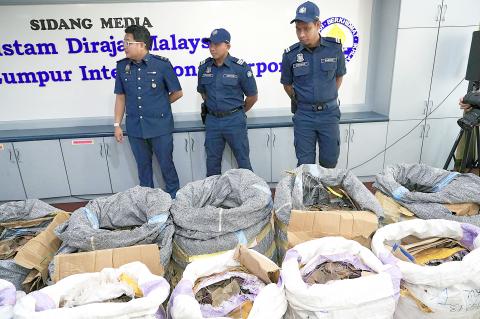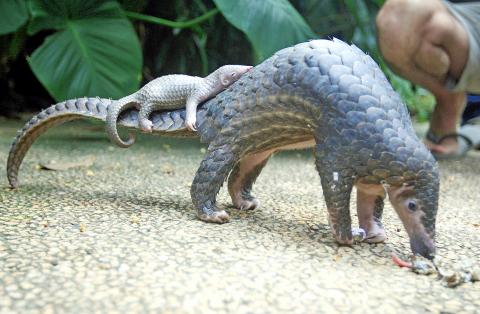When Chinese police found them in the trunk of a smuggler’s car, 33 of the trafficked pangolins — endangered scaly mammals from southern China — were still alive, wrapped in plastic bags soaked with their own urine.
However, the fate of the creatures whose scales are worth nearly their weight in silver on the black market was not a happy one.
Every pangolin died in government captivity within a few months of the August 2017 seizure.

Photo: AP
An environmental nonprofit in Beijing has launched an investigation, called “counting pangolins,” to figure out what happens to such animals recovered from the illegal wildlife trade. Its findings so far highlight discrepancies between environmental laws and outcomes.
China is hardly unique. The number of environmental laws on the books worldwide has increased 38-fold since 1972, according to a UN Environment Programme report released on Thursday.
However, the political will and capacity to enforce those laws often lags, undermining global efforts to curb issues such as wildlife trafficking, air pollution and climate change, the report found.

Photo: AP
“The law doesn’t self-execute,” said Carl Bruch, study coauthor and director of international programs at the Environmental Law Institute in Washington.
Each of the 33 pangolins transferred to the care of a government-run wildlife rescue center in China’s Guangxi Province died within three months, according to records obtained by the nonprofit China Biodiversity Conservation and Green Development Foundation.
What is still unclear is what happened to their bodies.
Pangolins are insect-eating, scaly mammals — playfully described by the International Union for Conservation of Nature as “resembling an artichoke with legs and a tail.”
Their scales — made of keratin, the same material in human fingernails — are in high demand for Chinese traditional medicine to purportedly cure arthritis, promote breast-feeding and boost male virility, although there is no scientific backing for these beliefs.
The price of pangolin scales in China has risen from US$11 per kilogram in the 1990s to US$470 in 2014, according to researchers at Beijing Forestry University.
Scientists have designated all eight species of pangolin as being at risk of extinction — four species in Asia and four in Africa.
More than 1 million pangolins were trafficked between 2004 and 2014 — for their scales, meat and blood — with China and Vietnam as the largest markets. In the past two decades, the number of pangolins worldwide has dropped by about 90 percent.
In 2016, the Convention on International Trade in Endangered Species of Wild Fauna and Flora adopted a worldwide ban on commercial trade in pangolins, and China later approved that ban. Pangolins are also listed as a protected species in China.
While state-run media have publicized a few high-profile poacher busts, watchdogs say that a thriving black market for endangered-animal parts persists.
In November 2017, customs officials in Shenzhen seized 11.9 tonnes of pangolin scales — reportedly the largest-ever seizure of scales from Africa — state media reported.
The penalties offenders face are not always publicized, but in another case involving a smaller shipment of scales, two smugglers received prison sentences of five years, state media said.
“It’s significant that China has adopted laws against trade in many endangered species, but the law itself isn’t enough to protect a species from extinction,” said Zhou Jinfeng (周晉峰), secretary-general of the China Biodiversity Conservation and Green Development Foundation.
Zhou wants the government to issue public records tracking all living and dead pangolins seized by authorities, and to offer evidence that contraband, including pangolin scales, is destroyed before it enters black markets.
“We are determined to know what happens to the pangolins,” foundation assistant secretary-general Sophia Zhang (張思遠) said.
After reading news reports about the August 2017 poaching bust, she filed information requests to government agencies and traveled to Guangxi to visit the wildlife rescue center.
The Guangxi Forestry Department, which manages the wildlife rescue center, declined requests for an interview and comment.
Xinhua news agency in December last year reported that China remains committed to stopping pangolin trafficking, adding that there were 209 pangolin smuggling busts from 2007 to 2016.
Less official attention has been paid to what happens after these busts.
In Guangxi, Zhang saw that pangolins were kept in small cages and fed cat food at the wildlife center, whereas wild pangolins eat termites. She said she had tried to coordinate with nonprofit Save Vietnam’s Wildlife to bring shipments of termites to feed the pangolins, but the center declined the offer.
After the animals died, the center would not reveal what happened to their bodies, but in other instances, the same center has turned over live pangolins to industry groups, including a steel factory in Guangdong Province and a farm associated with a Chinese traditional medicine center in Jiangxi Province. The government released this information on its Web site.
In response to an information request from Zhang, the Guangxi Forestry Department sent copies of the licenses held by these organizations for handling pangolins. The reason for transferring pangolins remains unclear.
“We want the wildlife center to provide a full explanation,” Zhang said. “We know the trade in pangolins is very lucrative. The public should be able to know what happens.”
The biodiversity nonprofit has filed information requests about trafficked wildlife in nearly 30 Chinese provinces and has attempted to verify what happens to pangolin scales seized by customs officials.
Wildlife rescue centers need better training to properly handle live animals, Zhang said.
“China has a rather complete set of environmental laws,” said Barbara Finamore, senior strategic director for Asia at the Natural Resources Defense Council in Washington. “But environmental laws are not worth the paper they’re written on unless there’s also strong enforcement and oversight.”
Countries large and small, rich and poor have passed extensive green legislation since the Rio Earth Summit in 1992.
“The world has made incredible progress in adopting environmental laws and environmental impact assessments, in creating environmental ministries and agencies,” Bruch said.
Now comes the hard part.
“The legal framework is there in an enormous number of countries,” said Deborah Seligsohn, a political scientist focusing on environmental policy at Villanova University. “But once you have all these laws, you need trained and willing personnel to actually enforce them. You need boots on the ground.”
Green mandates often go unfunded, said Barney Long, director of species conservation at Global Wildlife Conservation, a nonprofit in Austin, Texas.
“Many countries have laws stating the minimum number of park rangers that should be patrolling per square mile in national parks and protected areas, but these aren’t implemented if sufficient money isn’t appropriated,” Long said.
Non-governmental groups try to help close the gap between environmental laws and enforcement action, but in many countries, this is dangerous work.
In 2017, at least 207 environmental defenders — including forest rangers, advocates, journalists and inspectors — were murdered for performing such work, according to Global Witness, a research and advocacy group based in Washington and London.
However, there are some bright spots, experts say.
China is gradually releasing more environmental data, especially on air pollution, even as the government clamps down on other forms of information, and more officials are being held accountable, said Jennifer Turner, director of the Woodrow Wilson Center’s China Environment Forum in Washington.
“Before, local officials were only evaluated on economic performance, but now it’s harder to hide from environmental sins,” she said.

Auschwitz survivor Eva Schloss, the stepsister of teenage diarist Anne Frank and a tireless educator about the horrors of the Holocaust, has died. She was 96. The Anne Frank Trust UK, of which Schloss was honorary president, said she died on Saturday in London, where she lived. Britain’s King Charles III said he was “privileged and proud” to have known Schloss, who cofounded the charitable trust to help young people challenge prejudice. “The horrors that she endured as a young woman are impossible to comprehend and yet she devoted the rest of her life to overcoming hatred and prejudice, promoting kindness, courage, understanding

‘DISRESPECTFUL’: Katie Miller, the wife of Trump’s most influential adviser, drew ire by posting an image of Greenland in the colors of the US flag, captioning it ‘SOON’ US President Donald Trump on Sunday doubled down on his claim that Greenland should become part of the US, despite calls by the Danish prime minister to stop “threatening” the territory. Washington’s military intervention in Venezuela has reignited fears for Greenland, which Trump has repeatedly said he wants to annex, given its strategic location in the arctic. While aboard Air Force One en route to Washington, Trump reiterated the goal. “We need Greenland from the standpoint of national security, and Denmark is not going to be able to do it,” he said in response to a reporter’s question. “We’ll worry about Greenland in

PERILOUS JOURNEY: Over just a matter of days last month, about 1,600 Afghans who were at risk of perishing due to the cold weather were rescued in the mountains Habibullah set off from his home in western Afghanistan determined to find work in Iran, only for the 15-year-old to freeze to death while walking across the mountainous frontier. “He was forced to go, to bring food for the family,” his mother, Mah Jan, said at her mud home in Ghunjan village. “We have no food to eat, we have no clothes to wear. The house in which I live has no electricity, no water. I have no proper window, nothing to burn for heating,” she added, clutching a photograph of her son. Habibullah was one of at least 18 migrants who died

Russia early yesterday bombarded Ukraine, killing two people in the Kyiv region, authorities said on the eve of a diplomatic summit in France. A nationwide siren was issued just after midnight, while Ukraine’s military said air defenses were operating in several places. In the capital, a private medical facility caught fire as a result of the Russian strikes, killing one person and wounding three others, the State Emergency Service of Kyiv said. It released images of rescuers removing people on stretchers from a gutted building. Another pre-dawn attack on the neighboring city of Fastiv killed one man in his 70s, Kyiv Governor Mykola